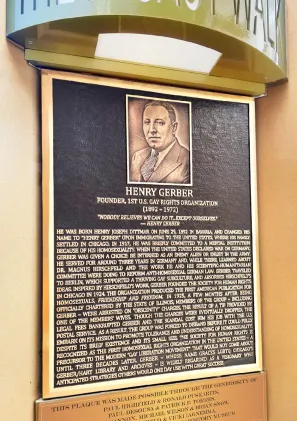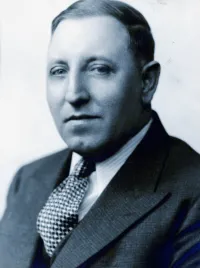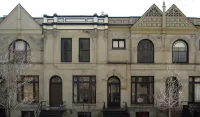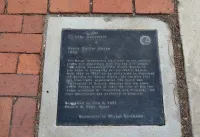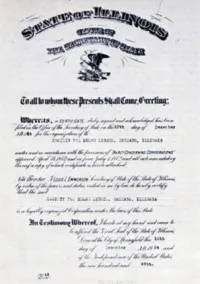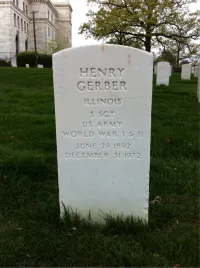Plaque Sponsor
Paul Highfield & Ronald Puskarits; Paul Desousa & Patrick F. Torres; Lori Cannon, Michael Wilson & Brian Snow; Mark Highfield & Vicki Lagnemma; Gerber/Hart Library; and the Chicago History MuseumBiography
1892 - 1972
“Nobody believes we can do it—reporters, opponents—except ourselves."
- Henry Gerber
He was born Henry Joseph Dittmar on June 29, 1892 in Bavaria, and changed his name to "Henry Gerber" upon immigrating to the United States, where his family settled in Chicago. In 1917, he was briefly committed to a mental institution because of his homosexuality. When the United States declared war on Germany, Gerber was given a choice: be interned as an enemy alien or enlist in the Army. He served for around three years in Germany and, while there, learned about Dr. Magnus Hirschfeld and the work he and his Scientific-Humanitarian Committee were doing to reform anti-homosexual German law. Gerber traveled to Berlin, which supported a thriving gay subculture, and absorbed Hirschfeld's ideas. Inspired by Hirschfeld’s work, Gerber founded the Society for Human Rights in Chicago in 1924. The organization produced the first American publication for homosexuals, Friendship and Freedom. In 1925, a few months after being officially chartered by the State of Illinois, members of the group – including Gerber – were arrested on “obscenity” charges, the result of a tip provided by one of the members’ wives. Though the charges were eventually dropped, the legal fees bankrupted Gerber and the scandal cost him his job with the U.S. Postal Service. As a result, the group was forced to disband before it could fully embark on its mission to promote tolerance and understanding of homosexuality. Despite its brief existence and its small size, the Society for Human Rights is recognized as the first homosexual rights organization in the United States – a precursor to the modern “gay liberation movement” that would not come about until three decades later. Gerber – whose name graces LGBT Chicago’s Gerber/Hart Library and Archives – is widely regarded as a visionary who anticipated strategies others would one day use with great success.
1892 - 1972
“Nobody believes we can do it—reporters, opponents—except ourselves."
- Henry Gerber
He was born Henry Joseph Dittmar on June 29, 1892 in Bavaria, and changed his name to "Henry Gerber" upon immigrating to the United States, where his family settled in Chicago. In 1917, he was briefly committed to a mental institution because of his homosexuality. When the United States declared war on Germany, Gerber was given a choice: be interned as an enemy alien or enlist in the Army. He served for around three years in Germany and, while there, learned about Dr. Magnus Hirschfeld and the work he and his Scientific-Humanitarian Committee were doing to reform anti-homosexual German law. Gerber traveled to Berlin, which supported a thriving gay subculture, and absorbed Hirschfeld's ideas. Inspired by Hirschfeld’s work, Gerber founded the Society for Human Rights in Chicago in 1924. The organization produced the first American publication for homosexuals, Friendship and Freedom. In 1925, a few months after being officially chartered by the State of Illinois, members of the group – including Gerber – were arrested on “obscenity” charges, the result of a tip provided by one of the members’ wives. Though the charges were eventually dropped, the legal fees bankrupted Gerber and the scandal cost him his job with the U.S. Postal Service. As a result, the group was forced to disband before it could fully embark on its mission to promote tolerance and understanding of homosexuality. Despite its brief existence and its small size, the Society for Human Rights is recognized as the first homosexual rights organization in the United States – a precursor to the modern “gay liberation movement” that would not come about until three decades later. Gerber – whose name graces LGBT Chicago’s Gerber/Hart Library and Archives – is widely regarded as a visionary who anticipated strategies others would one day use with great success.
Lesson Plan
Please login or register for an account to view this lesson plan.
Demography
Demography
Gender Male
Sexual Orientation Gay
Gender Identity Cisgender
Ethnicity Caucasian/White
Nations Affiliated Germany United States
Era/Epoch Homophile Movement (1945-1969) Interwar Period (1918-1939) Roaring Twenties (1920-1929)
Field(s) of Contribution
Advocacy & Activism
Editor
Journalism
Military
Social Justice
Social Sciences
US History
Commemorations & Honors
Gerber/Hart Library and Archives in Chicago Named After Gerber and Pearl Hart
Posthumous Chicago LGBT Hall of Fame Inductee (1992)
Henry Gerber House Named a Chicago Historic Landmark (2001)
Henry Gerber House Named a National Historic Landmark (2015)
Demography
Gender Male
Sexual Orientation Gay
Gender Identity Cisgender
Ethnicity Caucasian/White
Nations Affiliated Germany United States
Era/Epoch Homophile Movement (1945-1969) Interwar Period (1918-1939) Roaring Twenties (1920-1929)
Field(s) of Contribution
Advocacy & Activism
Editor
Journalism
Military
Social Justice
Social Sciences
US History
Commemorations & Honors
Gerber/Hart Library and Archives in Chicago Named After Gerber and Pearl Hart
Posthumous Chicago LGBT Hall of Fame Inductee (1992)
Henry Gerber House Named a Chicago Historic Landmark (2001)
Henry Gerber House Named a National Historic Landmark (2015)
Resources
Resources
Elledge, Jim. An Angel in Sodom: Henry Gerber and the Birth of the Gay Rights Movement. Chicago: Chicago Review Press, 2022.
Elledge, Jim. The Boys of Fairy Town: Sodomites, Female Impersonators, Third-Sexers, Pansies, Queers, and Sex Morons in Chicago's First Century. Chicago: Chicago Review Press, 2018.
http://www.pbs.org/outofthepast/past/p3/gerber.html
http://chicagolgbthalloffame.org/gerber-henry/
http://www.gerberhart.org/meet-henry-and-pearl
http://www.nps.gov/gois/learn/historyculture/henry-gerber.htm
https://webapps1.chicago.gov/landmarksweb/web/landmarkdetails.htm?lanId=1313
http://www.encyclopedia.chicagohistory.org/pages/508.html
Resources
Elledge, Jim. An Angel in Sodom: Henry Gerber and the Birth of the Gay Rights Movement. Chicago: Chicago Review Press, 2022.
Elledge, Jim. The Boys of Fairy Town: Sodomites, Female Impersonators, Third-Sexers, Pansies, Queers, and Sex Morons in Chicago's First Century. Chicago: Chicago Review Press, 2018.
http://www.pbs.org/outofthepast/past/p3/gerber.html
http://chicagolgbthalloffame.org/gerber-henry/
http://www.gerberhart.org/meet-henry-and-pearl
http://www.nps.gov/gois/learn/historyculture/henry-gerber.htm
https://webapps1.chicago.gov/landmarksweb/web/landmarkdetails.htm?lanId=1313
http://www.encyclopedia.chicagohistory.org/pages/508.html
